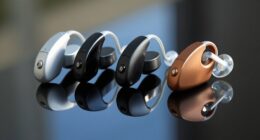Have you ever considered the connection between tinnitus and cochlear implants and how they affect individuals struggling with hearing issues?
Understanding the complexities of these two elements is key to navigating the landscape of auditory health and well-being.
As we explore the intricate relationship between tinnitus and cochlear implants, we uncover essential insights that can significantly impact individuals' quality of life.
Join us on this journey of discovery as we unravel the mysteries behind these crucial components of hearing health.
Key Takeaways
- Cochlear implants reduce tinnitus severity and distress.
- Over 50% of recipients report positive changes in tinnitus perception.
- Implants offer relief and improve quality of life for those with tinnitus and severe hearing loss.
- Candidates should consider benefits and limitations after comprehensive evaluations.
Causes and Impact of Tinnitus
Tinnitus, a common auditory condition, can arise from various factors such as hearing loss, exposure to loud noise, and underlying health issues. It affects approximately 30% of the population, with a significant 80% of individuals with severe-profound hearing loss experiencing tinnitus.
The impact of tinnitus goes beyond the auditory realm, often leading to distress, anxiety, and disruptions in sleep patterns, ultimately affecting the overall quality of life for many individuals.
Effective management strategies are crucial for individuals experiencing tinnitus. These strategies may include sound therapy, counseling, relaxation techniques, and cognitive behavioral therapy to help individuals cope with the distressing symptoms. For those with severe hearing loss, cochlear implants have shown promise in reducing the severity and perception of tinnitus.
How Cochlear Implants Work

Utilizing advanced technology, cochlear implants function by bypassing damaged components of the ear to directly stimulate the auditory nerve with electrical signals. The external part of the implant captures sound waves, while the internal part contains electrodes in the cochlea that convert sound into electrical impulses.
By stimulating the auditory nerve pathway, cochlear implants enable users to comprehend these new electrical signals, leading to improved hearing and speech clarity. This technology is especially beneficial for individuals with severe hearing loss, as it can significantly enhance their quality of life by overcoming issues related to impaired inner ear hair cells.
Cochlear implants work by directly addressing the root cause of hearing loss, providing a way to restore auditory function and improve the ability to understand speech. By effectively stimulating the auditory nerve, these devices play a crucial role in helping individuals regain a sense of normalcy in their hearing abilities.
Relief From Tinnitus With Implants
Moving beyond the restoration of hearing function, cochlear implants have emerged as a promising solution for alleviating the burden of tinnitus in individuals with severe-profound hearing loss. Studies have shown that cochlear implants can lead to a decrease in tinnitus severity, with many recipients experiencing relief from tinnitus distress post-implantation. The suppressive effect of cochlear implants on tinnitus perception can significantly enhance the quality of life for those suffering from both hearing loss and tinnitus.
Research indicates that cochlear implantation can result in notable improvements in tinnitus perception scores, with over 50% of patients reporting positive changes. This improvement in tinnitus perception not only benefits the individual's overall well-being but also contributes to a better auditory experience post-implantation.
For individuals struggling with severe-profound hearing loss and the added burden of tinnitus, cochlear implants offer a ray of hope by not only restoring hearing but also potentially providing relief from the distressing symptoms of tinnitus.
Considerations for Cochlear Implant Candidates

Considering candidacy for cochlear implants involves a thorough evaluation process that assesses the severity of hearing loss and the potential benefits of the procedure for individuals not adequately aided by hearing aids. Candidates with severe to profound hearing loss, experiencing troublesome tinnitus, and not benefitting from traditional hearing aids may be suitable for cochlear implants. Consultation with both an ENT specialist and an audiologist is crucial before deciding on cochlear implantation. Comprehensive evaluations are conducted to determine if a candidate meets the criteria for cochlear implantation. The decision-making process includes weighing the benefits, limitations, and potential risks associated with the procedure for each individual. Here is a table summarizing the key considerations for cochlear implant candidates:
| Considerations | Details |
|---|---|
| Hearing Loss | Candidates should have severe to profound hearing loss not effectively managed by aids. |
| Tinnitus | Those with troublesome tinnitus alongside hearing loss may find relief with cochlear implants. |
| Evaluation Process | Comprehensive assessments by ENT specialists and audiologists are essential. |
| Benefits and Limitations | Candidates must consider the potential benefits and limitations of cochlear implantation. |
Industry Terminology and Related Conditions
Exploring the terminology prevalent in the industry and its association with related conditions offers valuable insights into the realm of tinnitus and cochlear implants.
Key Points:
- Tinnitus and Hearing Loss: Individuals with severe-profound hearing loss often experience tinnitus, with a significant percentage reporting symptoms, highlighting the interconnected nature of these conditions.
- Cochlear Implants: These electronic devices are designed to treat severe hearing loss by directly stimulating the auditory nerve, bypassing damaged parts of the ear, showing promise in alleviating tinnitus perception and severity.
- Research Studies and Quality of Life: Research studies indicate that cochlear implants may have a suppressive effect on tinnitus, ultimately improving the quality of life for those affected by both hearing loss and tinnitus.
Understanding the terminology associated with cochlear implants and tinnitus can provide a deeper comprehension of how these electronic devices can positively impact individuals' perceptions and overall well-being.
Frequently Asked Questions
Can You Still Have Tinnitus With a Cochlear Implant?
Yes, you can still have tinnitus even after getting a cochlear implant. While many individuals experience a reduction in tinnitus symptoms post-implantation, some may not see improvement.
Changes in tinnitus perception are common following cochlear implant surgery. Support teams can offer guidance on managing tinnitus after receiving a cochlear implant.
It's essential to communicate any concerns about tinnitus to your healthcare provider for appropriate support and management strategies.
What Must I Avoid Now I Have a Cochlear Implant?
We must mindfully manage our environment post-cochlear implantation. Avoiding excessive moisture and strong magnetic fields is crucial to prevent damage.
High noise levels can harm hearing, so steer clear of noisy settings. Refrain from using headphones near the implant site to prevent interference.
Follow healthcare team guidelines for optimal safety and function. Adhering to these precautions ensures the longevity and effectiveness of our cochlear implants.
What Percentage of Patients Receiving Cochlear Implants Report Some Tinnitus Relief?
We've seen that studies indicate around 50-80% of patients who get cochlear implants report experiencing some level of relief from tinnitus after the procedure.
This percentage can vary depending on individual factors and the severity of the tinnitus.
It's important for patients to understand that while some may experience significant relief, others may only notice a mild improvement or no change at all in their tinnitus symptoms post-implantation.
What Are Some Problems With Cochlear Implants?
When it comes to cochlear implants, some issues to consider include the risk of infection, device malfunction, or even rejection. These problems can sometimes lead to surgical complications or require additional medical interventions.
It's crucial to stay vigilant and address any concerns promptly to ensure the best possible outcome for individuals relying on these devices to improve their hearing.
Conclusion
In conclusion, navigating tinnitus and cochlear implants can be like embarking on a journey through a maze of sound. With the help of cochlear implants, individuals can find relief from the constant buzzing and ringing, allowing them to rediscover the beauty of clear, crisp sound.
It's a transformative process, akin to stepping into a symphony hall after years of static noise. Embrace the possibilities that come with this technological advancement and the newfound harmony it can bring to your life.










